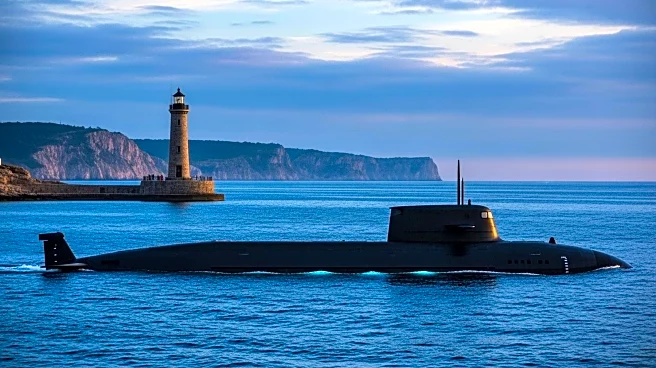What's Happening?
A Russian Kilo-class diesel-electric submarine, Novorossiysk, recently surfaced off the coast of France, leading to speculation about its condition. The Kremlin stated that the submarine surfaced to comply with maritime transit rules in the English Channel.
However, social media accounts linked to Russian security forces suggested that the submarine suffered a fuel leak, forcing it to surface to empty flooded compartments. Reports indicated that the vessel lacked spare parts and qualified specialists onboard to address the malfunction, posing an explosion hazard. The submarine was shadowed by French, English, and Dutch naval forces as it moved north, eventually leaving the Dutch Exclusive Economic Zone.
Why It's Important?
The incident highlights ongoing tensions between NATO and Russia, particularly concerning naval operations in international waters. The presence of NATO forces shadowing the Russian submarine underscores the alliance's vigilance in monitoring Russian naval activities, which are perceived as potential threats to submarine infrastructure. This situation could exacerbate geopolitical tensions, affecting diplomatic relations and military strategies in the region. The incident also raises concerns about the operational readiness and safety of Russian naval vessels, which could impact Russia's maritime capabilities and influence in European waters.
What's Next?
NATO and its member states may continue to closely monitor Russian naval movements, especially in sensitive areas like the English Channel and the North Sea. Diplomatic discussions or warnings could be issued to Russia regarding the safety and compliance of its naval operations. Additionally, Russia might need to address the technical and maintenance issues of its submarines to prevent future incidents and ensure the safety of its crew and vessels.
Beyond the Headlines
The incident may prompt broader discussions on international maritime law and the rights of nations to transit through international waters. It could also lead to increased scrutiny of Russia's adherence to these laws and its naval capabilities. The situation might influence future naval policies and cooperation among NATO members to safeguard maritime infrastructure and ensure regional security.
















